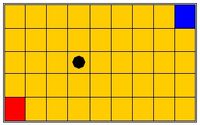Mr Mancala (talk | contribs) No edit summary |
Mr Mancala (talk | contribs) |
||
| (6 intermediate revisions by the same user not shown) | |||
| Line 1: | Line 1: | ||
{| align=right border=1 |
{| align=right border=1 |
||
| − | |''' |
+ | |'''Slimetrail''' |
|- |
|- |
||
|''Inventor:'' Bill Taylor,<br/> 1992 |
|''Inventor:'' Bill Taylor,<br/> 1992 |
||
| Line 11: | Line 11: | ||
|} |
|} |
||
| − | ''' |
+ | '''Slimetrail''' was invented by Bill Taylor (New Zealand) in 1992. It was the first game with "shared" sowing that leaves a common track. |
| − | The game-theoretical values of many |
+ | The game-theoretical values of many Slimetrail boards were analyzed by Dave Boll (USA) in 1993. |
| − | On January 12, 2008, the game was implemented by [[Arty Sandler]] on |
+ | On January 12, 2008, the game was implemented by [[Arty Sandler]] on igGameCenter. |
==Rules== |
==Rules== |
||
| Line 32: | Line 32: | ||
==Variants== |
==Variants== |
||
| − | ===Chess King |
+ | ===Chess King Slimetrail=== |
The piece may move like the king in the game of Chess. |
The piece may move like the king in the game of Chess. |
||
| − | ===Hex |
+ | ===Hex Slimetrail=== |
Slime Trail can also be played on a rhombus board instead of a rectangular one. According to Dave Boll the targets are best in the obtuse corners, since having them in the acute corners easily result in draws. |
Slime Trail can also be played on a rhombus board instead of a rectangular one. According to Dave Boll the targets are best in the obtuse corners, since having them in the acute corners easily result in draws. |
||
| Line 42: | Line 42: | ||
===No Draws=== |
===No Draws=== |
||
| − | João Neto claims that ''"it is illegal to go to a cell from which it becomes impossible to reach any home cell"''. This is contrary to the oldest description of the game (published in |
+ | João Neto claims that ''"it is illegal to go to a cell from which it becomes impossible to reach any home cell"''. This is contrary to the oldest description of the game (published in 1993), which permitted draws. |
==External Links== |
==External Links== |
||
| − | * [http://www.gamecabinet.com/rules/Slimetrail.html |
+ | * [http://www.gamecabinet.com/rules/Slimetrail.html Slimetrail at Game Cabinet] |
| − | * [http://www.di.fc.ul.pt/~jpn/gv/slimetrail.htm |
+ | * [http://www.di.fc.ul.pt/~jpn/gv/slimetrail.htm Slimetrail on World of Abstract Games] |
* [http://www.deskovehry.info/pravidla/slime-trail.htm Czech Rules] |
* [http://www.deskovehry.info/pravidla/slime-trail.htm Czech Rules] |
||
| − | * [http://www.iggamecenter.com/info/en/slimetrail.html |
+ | * [http://www.iggamecenter.com/info/en/slimetrail.html Slimetrail at igGameCenter] |
| + | * [http://www.academia.edu/2289475/Slimetrail-Game_Playing_and_Expertise_in_Blind_and_Poor_Vision_Students Slimetrail-Game Playing and Expertise in Blind and Poor Vision Students] |
||
==Copyright== |
==Copyright== |
||
Latest revision as of 09:13, 19 March 2013
| Slimetrail |
| Inventor: Bill Taylor, 1992 |
| Ranks: N by M |
| Sowing: Fractured |
| Region: New Zealand |
Slimetrail was invented by Bill Taylor (New Zealand) in 1992. It was the first game with "shared" sowing that leaves a common track.
The game-theoretical values of many Slimetrail boards were analyzed by Dave Boll (USA) in 1993.
On January 12, 2008, the game was implemented by Arty Sandler on igGameCenter.
Rules

Possible Position on a 5x9 Board after Move 1
The game is played on a NxM rectangle of squares. Each player has a goal square in one corner of the board, diagonally opposite to his opponent's goal square.
The first player places a piece on any square except the goal squares (or "targets").
Then the pie rule is used to determine who plays next.
After that a player moves the piece to an orthogonally adjacent square, leaving a token (e.g. a Go stone) on the square he vacates.
It is not permitted to visit a square twice.
The player whose goal square is reached first (it doesn't matter by whom) wins. If no player can reach his target, the game is a draw.
Variants
Chess King Slimetrail
The piece may move like the king in the game of Chess.
Hex Slimetrail
Slime Trail can also be played on a rhombus board instead of a rectangular one. According to Dave Boll the targets are best in the obtuse corners, since having them in the acute corners easily result in draws.
Slime-Moku
A variant with a different winning condition is Slime-Moku.
No Draws
João Neto claims that "it is illegal to go to a cell from which it becomes impossible to reach any home cell". This is contrary to the oldest description of the game (published in 1993), which permitted draws.
External Links
- Slimetrail at Game Cabinet
- Slimetrail on World of Abstract Games
- Czech Rules
- Slimetrail at igGameCenter
- Slimetrail-Game Playing and Expertise in Blind and Poor Vision Students
Copyright
© Ralf Gering
Under the CC by-sa 2.5 license.